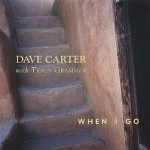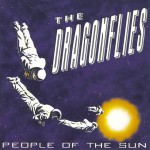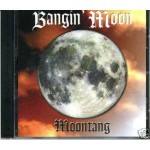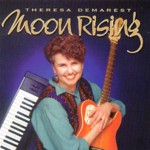 Dave Carter w/ Tracy Grammer
Dave Carter w/ Tracy Grammer
When I Go
Self-Produced
The craft of creating the “story” song goes back at least as far as the days of the bards who wrote and sang “Childe Roland” and “Beowulf;” or to Homer’s “Odyssey;” if not even further to the Old Testament of biblical times. In those days, the stories celebrated the adventures of a king, leader, chieftain or some other cultural hero.
More recently the technique has been adapted by the likes of Bob Dylan, Danny O’Keefe, Mickey Newbury, Arlo Guthrie, Harry Chapin and James Taylor. These modern-day bards relate the tales of average people, whom by the sheer mundanity of their lives, become nearly heroic in stature. In past times, this was called farce. But little here is particularily whimsical or farcical. Earnest is perhaps a better word.
Dave Carter is that sort of songwriter. The characters who populate his fables are often rednecks and losers, hippies and drugstore cowboys, misfits and crackpots. With glib dexterity, this well-versed wordsmith details the exploits of these weary denizens, while showing a strong sense of humanity and compassion.
His songs are uncomplicated compositions, to which he lends simple acoustic guitar or banjo accompaniment, with occasional bass guitar underpinnings. He is joined by Tracy Grammer, who along with pleasant soparano backup vocals provides delicate violin and mandolin embroideries, as well as intermittent backing acoustic guitar.
Stylistically, Carter runs with Dylan and Taylor, while vocally he sometimes recalls Mickey Newbury, Michael Murphy (“Wildfire”) and Tim Hardin. Among his contemporaries, he sounds a little like David Wilcox. Actually, the title track, the first tune on the record, is more like the historic ballads of yore. Over a lone banjo arpeggio, Carter, with nice harmonies from Grammer, summons many archetypal and poetic images, while traversing a familiar folk melody. A fierce little violin/banjo foray at the very end of the tune is especially delicious.
“Don’t Tread On Me” revolves around a chord progression first established by the Kingsmen with “Louie Louie.” Carter adds his own modifications as the song unravels. He weaves a narrative regarding hillbillies in the outback and Washington DC, while quoting Dylan and the Stones. “Annie’s Lover” reminds of Kenny Loggins in his “House On Pooh Corner” period.
“Grand Prairie Texas Homesick Blues” explores the strange dichotomy that lies within the fact that “Hellbent on revival, lookin’ to grow some roots/I have mortgaged my survival on these worn out cowboy boots/But there’s just one horse in forty miles, he’s the prized possession of the Dallas zoo/ And he feels like a stranger too.” Other observations, also along the lines of the dying of the Old West and the values thereby associated, are delivered in quick succession.
A fanciful depiction is “The River, Where She Sleeps,” which echoes John Hartford’s “Gentle On My Mind,” while coyly referring to the Beatles’ “Let It Be.” “Lancelot” invokes a Quixotic motif beneath a tender Western arrangement. Lyrics such as”Lancelot rode on a swaybacked mare/He won in a card game up North somewhere/He was bottom-out lonesome, he was too tired to care/Keepin’ one step ahead of the rain/Well he blew into Broken Bow late last year/Talking of the vision of his lost Guinevere/But he couldn’t tell a grail from a glass of beer/So he settled for Lady Elaine,” show a wryly gentle sense of humor.
“Frank To Valentino” makes a passing nod at Tim Hardin’s “Reason To Believe,” while recounting the life of a Medford inhabitant who gets his kicks by dressing up like a Disco hipster and hanging out in Reno. Carter throws in a John Hiatt-like metaphor in the line: “a close-range victim of her sawed-off mouth.” “Liza Jane” is a trucker yarn that meets up with Charlie Daniels’ Devil somewhere out on I-95. And the Mickey Newburyish “Elvis Presley” is a sadfaced stroll with the King’s ghost across the vast wasteland that we call the US of A.
Dave Carter proves himself to be a very capable songwriter and storyteller. While his melodies are fairly pedestrian, the evocative nature of his twangy tenor is a compelling factor, personalizing songs that might otherwise sink from the weight of their own subject matter. While the 4-track approach to recording no doubt made of this a comfortably affordable project for Carter, adding a definite sense of intimacy— a little more production might have helped to flesh out certain individualized qualities in some of the songs. But other than that minor quibble, Carter seems to be availed of a strong talent as a singer, a songwriter and a musician; and he would be someone we can look forward to hearing more from in the future.
 The Dragonflies
The Dragonflies
People Of The Sun
Agent-X Records
Nearly a concept album, in that the themes of most of the songs seem to deal with some sort of intergalactic intrigue; this record lacks a real concept to hold it all together. Instead we get Cheap Trick doing Bowie’s “Space Oddity” or Ziggy Stardust on Uranus, which may not be a bad thing necessarily, but, needless to say, there’s often a lot of attitude floating around the space station.
Lyricist, rhythm guitarist and lead singer Michael Ormando is an intelligent, imaginative writer with an extensive vocabulary— who would probably be comfortable hanging out with Michael Jarmer of Here Comes Everybody. As a singer, Ormando relies on so many annoying vocal mannerisms, it is hard to get a read on just what, exactly, his voice really sounds like. A little Bowie, a splash of Robin Zander, a touch of Rush’s Geddy Lee and way too much of the annoying characteristics of Styx’ Dennis DeYoung.
Despite all that. Ormando is a very talented individual and this is a very solid four-piece band. Lead guitarist Scott Byrd has riffage aplenty for Ormando’s nine original songs and one cover of (surprise!) Cheap Trick’s “Surrender.” The rhythm section of veteran bassist Jeff Buehner and drummer Craig McKinney provides a firm foundation over which the pyrotechnics take place.
The record begins with the title track, a bizarre tale about a delusional individual who somehow manages to work in the everyday world, wearing a business suit while he imagines himself to be walking in space. Nice work if you can get it. “Highway Of The Kings” is a tight, hard rocking number that seemingly explores the history of space flight, ending up…who knows where? “Went to the moon with Apollo 10/The man who fell to earth just got up again that day.” Here Ormando refers, of course, to the final mission preceding Neil Armstrong’s historic moon landing with Apollo 11.
Moving from the third-person perspective of the first two songs to a first-person scenario, Ormando investigates the human propensity for bigotry and hatred: “I hoped intelligence and the color of the skin/Was to us like zero, irrelevant as the wind.” It’s not entirely clear what is meant in that couplet, but the words sound nice. The band highsteps gingerly through the chunky chords of the verses and the power guitar of the catchy chorus. A good song, along the lines of Jellyfish. Similarly, the catchy melodies and slick vocals of “The Machine” exude a distinctive Jellyfish essense as well.
Rush Influences come to the fore on “The Shadow,” a dark and moody piece, with a somewhat corny, but well-honed chorus. “I’m An Alien” takes the lonely sailor at sea analogy to the moon. “Even though I’m an alien on this lunar mountain landscape/Will you hear every time I call home?/Million miles away— here on this outpost/Of a world I never wanted.” Either out moon has swung desperately out of orbit in Ormando’s world, or he has his astronomical computations configured inappropriately. Perhaps “the million miles away” reference is more to a state of mind than a fact of distance. The difficulties presented in the second verse are far more problematic. Still, it’s a catchy song that plays with time signatures between the verses and the memorable chorus.
Over a skittering muted guitar figure “The Cinema” unreels as a late ’30s period piece, lyrically anachronous in regard to all the songs that preceded it, but musically integral, as with the powerful rush of the second half of the verses, the rampant march of the glorious chorus. The Dragonflies take on Cheap Trick’s “Surrender” is reverentially faithful to a fault, lacking only the energy and over-the-top excitement of the original.
The Dragonflies are an accomplished quartet, brimming with hooks and chops, who seem just on the verge of finding their own true sound. Michael Ormando’s reliance on vocal shtick is a mask to truer feelings he rarely chooses to expose. Like Bowie thirty years before him, he chooses alien plot devices as an allegorical expression of his own deeper emotions. Like Bowie before him, hopefully he too will outgrow the habit.
For, just as an audience appreciates precision and forthrightness in a musical presentation, it also appreciates honesty in the lyrical category as well. But as time will evolve for the Dragonflies their own musical style, time too will afford Ormando the context and vocabulary to speak his heart as well as his mind.
 Bangin’ Moon
Bangin’ Moon
Moontang
Self-Produced
There is perhaps not a lot of mystery surrounding a band that elects to call itself Bangin’ Moon, even less regarding an album entitled Moontang. We can be certain that these Bangin’ Moons are bad boys and they’re up to no good. Well, boys these guys are not. The average age for this bunch must be thirty-five. But, by the sound of them, they’re up to no good— that much is indisputable.
But dig under the surface of Dan Hurtz’ snarling vocals, the twin guitar onslaught of Mike Suter and Vido Sinn, and the hammer-weilding rhythm section of bassist Randy Blanchard and drummer Preston Hatch, and you find lyrics that are more introspective and less venomous than one might expect. Why, there’s even one ballad that contains string-drenched synth backing!
Producer Dane Peterson, of Fall From Grace, elicits strong performances from the band across the five cuts presented on this EP. The music is somewhat derivative, sounding like a composite of Judas Priest, White Zombie and Black Sabbath, among others.
Instrumentally, “Burning Feeling” reeks of forboding and menace, with Hurtz growling ghoulishly over twisting guitar riffs. But more than song of evil and depravity, it is a discourse on “movin’ on.” “Departure” is exactly what is advertised to be. Over winsome arpeggiated chords, guest keyboardist Bryce Van Patton lays thick mellotron-like synth string pads. Hurtz, striving for a sense of Ozzie intimacy, ruminates upon a broken relationship.
Ozzie comes to mind again on “Lust Not Love.” Over rapid-fire machine gun guitar lickage, Hurtz creaks and soars in a somewhat familiar fashion. He sports a cockney sneer on the hard charging “Break Away.” Over more furious guitar machinations Hurtz howls about lifestyle changes in the new millenium… or that could be one interpretation, anyway.
“Flash Back” recalls the original AC/DC in some ways, with some very nice ensemble work in the shimmering solo break that departs from the main stylisytic thesis. The secret sixth track is a weird, very weird, take on Bob Marley’s “Jammin’.” “We wear pajamas/We bang the moon at night.” Well I guess that explains at all.
Bangin’ Moon, while not being a terribly original metal band, still muster a serious rumble. Guitarists Suter and Sinn intertwine seamlessly, playing harmonic lines with precision and skill. And Hurtz is a talented vocalist, if perhaps somewhat faceless in his delivery. Versatile, chameleon-like, but not particularily memorable either. The lyrics, though not always congruent or articulate, still show a sense of maturity (for the genre). This is a band that is better than their name would lead you to believe.
 Theresa Demarest
Theresa Demarest
Moon Rising
Joshua Records
Theresa Demarest has been an anchor within the local Folk music community for nearly twenty years. Her unique ability to gather together quality musicians for her various projects has never been stronger than on this recording. Surrounding herself with the cream of local session musicians: guitarist Tim Ellis, keyboardist Jannice Scroggins, background vocalists Linda Hornbuckle and Myrtle Brown; the rhythm section of drummer Jeff Cumpston and bassist Jimmy Solberg; reedmen Dennis Springer on sax and veteran Dick Saunders on claritnet. An All-Star cast of the highest order.
It is an extremely odd coincidence, yet vastly interesting to note, that both Theresa’s CD and that of the previously mentioned Bangin’ Moon bear the imprint of a full moon upon their surface— the significance of which, we can only ponder with wonderment and awe. It must be also noted in addition that the lunar images used are entirely different from one another, a fact which also probably bears close scrutiny.
Musically, of course, there is no similarity whatsoever.
Demarest is the creator of sparkling compositions, skillfully crafted; realized here with incredible deftness. Her rich contralto contains elements of Joan Baez, Emmilou Harris and even kd laing, without sounding imitative. She writes in diverse musical styles, from the moody, Loreena McKennitt tinged colors of the title track to the bluesy “Sunshine In The Evening;” from the torch ballad “Haven’t Got The Time” to the funky soul of “Get Your Own Wings To Flyin’.” Theresa touches all the bases.
This is simply a first rate recording from start to finish with stalwart performances from every musician involved. Demarest sings with all the ease of a performer who has become comfortable with her voice, her heartfelt songs that are rich with life as well as spiritual vitality. A fine album by a true artist.
